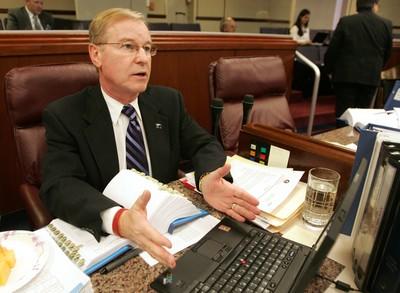Parole Board under scrutiny

CARSON CITY — Lawmakers still are considering a bill that would make Parole Board hearings subject to Nevada’s open meeting law after a proposal that would have exempted the board died in an Assembly committee.
Supporters of Assembly Bill 416 said it would restore “balance in government,” adding that the board doesn’t have enough oversight or transparency. But a Parole Board representative said the bill could result in inmates getting victims’ personal information.
Backers of the bill include inmate rights advocates as well as Assemblyman David Parks and Assemblyman Harvey Munford, both Las Vegas Democrats.
The bill also calls for more oversight of the Department of Corrections and would give judges more flexibility on sentence enhancements for certain crimes.
It’s part of a package of measures that could overhaul the state’s criminal justice system over the next few years.
Flo Jones, who has advocated for change in the parole system, told the Senate Judiciary Committee that the bills under consideration were a necessary correction to overly harsh sentencing laws passed in the 1990s.
“The bills are long overdue,” Jones said.
“Truth-in-sentencing came along, people got upset, and now we are stuck in the quagmire, trying to pay for it.”
Under current law, Parole Board meetings are public, but the board also may take testimony from victims confidentially.
Under the open meeting law, the board would have to allow inmates to observe all proceedings, Parole Board spokesman David Smith said. The bill also would require the board to provide all the information that it considered in making its decision to the prisoner, which could result in inmates getting their hands on victims’ personal information, he said.
“They would feel further victimized by having to let their feelings be known to the inmate,” Smith said.
“Some of them have changed their appearances, moved away. They fear retaliation from inmates.”
The bill also would create timelines for notifying inmates about their hearings and grant all inmates the right to be present at a hearing. Currently, hearings for low-level offenders — about one-third of total hearings — are conducted without the prisoners present, Smith said.
The state Supreme Court is considering a case involving Parole Board compliance with the open meeting law. In a letter to the Legislature, the board asked lawmakers either to exempt it from the open meeting law or give it the time and money needed to comply effectively.
“We’ve tried to get this resolved one way or another,” Smith said.
“If the open meeting law becomes part of the process, the board can’t afford to not comply in every way or we’ll risk continuous challenges from inmates and victims.”
Such compliance would cost the board about $3 million in the coming two-year budget, he added.
2007Nevada Legislature












